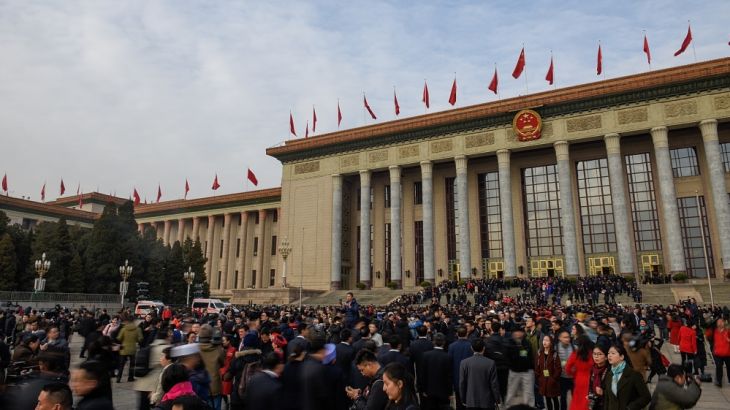National People’s Congress set to grant President Xi his wish
China’s National People’s Congress will be asked to approve changes to constitution that will allow presidents to serve more than two terms.

Beijing, China – To many Chinese people, Tiananmen Square is a haunted place.
It has been the setting of the best and worst in Chinese history.
In 1949, Mao Zedong proclaimed the establishment of the People’s Republic of China here. Forty years later, tanks and soldiers were sent to end weeks of occupation by students demanding greater democracy.
Those tumultuous events are still regarded by many sinologists as the greatest threat to the survival of the Communist Party of China.
At the edge of this square now, a new political drama is unfolding as China’s Parliament, the National People’s Congress (NPC), is holding its annual session.
Often described as a rubber stamp legislature, it is controlled by the Communist Party, just like the mainland media organisations who have fielded 2,000 journalists to cover the event.
China’s political season is a carefully choreographed event where displays of dissent are rare.
This year, the loyalty of the roughly 3,000 delegates is especially important.
On Sunday, they will be asked to approve changes to the constitution that restricts the presidents from serving more than two terms.
China’s parliamentarians know what is expected of them. Besides, the NPC does not do surprises.
“Those capable people should stay in their posts as long as possible,” said a female delegate dressed in the traditional costume of the ethnic Zhuang group.
Another one was more forthright.
“The decision is made by the party. As a delegate I fully support it,” she said.
Given the vast majority of delegates feel the same way – at least in public – it’s fair to assume that President Xi Jinping will get his way when the vote takes place on Sunday.
Warning to rivals?
But why is Xi making this power grab now? He has only just started his second term. He could have waited another three or four years.
According to analysts, the most likely reason is that he wants to send a warning to any potential rivals.
Deng Xiaoping, the late paramount leader, was responsible for the two-term limits being written into the constitution in 1982.
He wanted to prevent what is taking place now – a repeat of the cultish devotion that had surrounded Mao and which eventually led to the chaos cultural revolution.
There are a few commentators in China today who are prepared to criticise the proposed amendment.
“I don’t think the attempt to revise the constitution is welcomed by the public, even among those who’re loyal to the party,” said Deng Yuwen, not afraid of speaking out.
“It was considered difficult to overthrow this tradition. But Xi has done so with a snap of his fingers.”
Deng added that people find what’s happening “unbelievable”.
There are no opinion polls in China so it’s not possible to gauge what the public truly thinks. But on a busy Beijing street last weekend, a few people were willing to share their views.
Surprisingly, it was not all positive.
“Can I say what I mean,” asked a young woman. Her caution was understandable but she wanted to answer our question.
“This has not happened in other countries before. If he changed the constitution like this, then it’s back to the old days.”
|
|